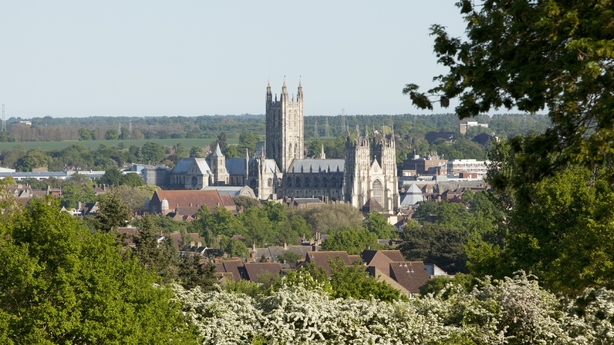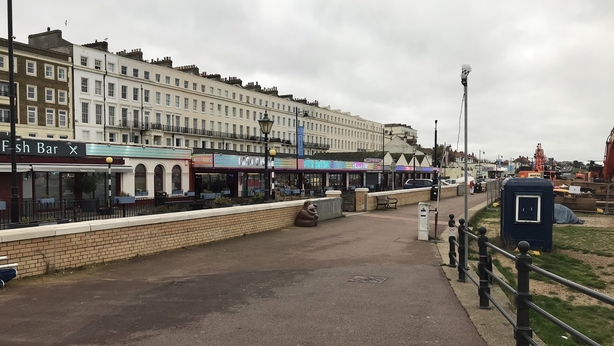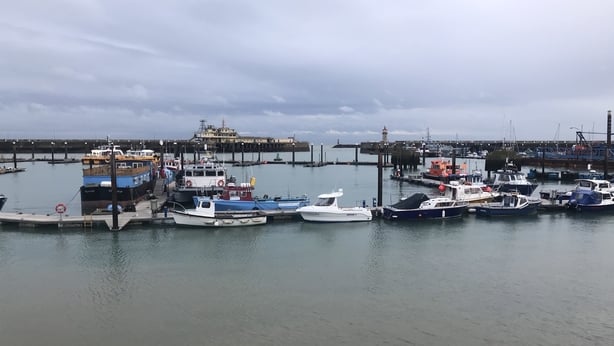"I’m just tired," says Samuel Mortimer, a physics student at the University of Kent. "It’s probably one of the biggest political events of our lifetime, but it's just so exhausting sometimes."
He speaks of course, about Brexit, the seemingly unending, ghastly political mind game, that has taken control of public life in the UK for the past two years.
Samuel is one of dozens of people to speak to me on a whistle stop tour of the South East of England this week.
The trip begins in Canterbury, once one of the great European cities of pilgrimage, made famous by the medieval poet Geoffrey Chaucer.
In Chaucer’s Canterbury tales, pilgrims are challenged to a storytelling contest, the winner of which was supposed to receive a free meal on their return to London.
Like the tales themselves, Brexit has been a battle of the yarn spinners, with each political storyteller attempting to convince the weary listener that their version of events should win out.
And as with Brexit, the Canterbury tales remain unfinished. The real winner is never announced.

The next chapter of this modern day epic tale will be written in the coming days, when MPs in London vote on the deal agreed with the EU.
"The big thing for me is the end of the freedom of movement. Before, if I got a job in Germany, I could just move there, but now I’m going to be seeing a lot more restrictions," says Sam Mortimer.
In the city centre Ian Morris, a retired businessman, describes Brexit as "frankly, a catastrophe".
He points out that Canterbury is just a few miles from the port of Dover where Brexit could have a major impact.
"If we get the no-deal scenario with border checks at Dover, it’s going to be a disaster. A two-minute delay can cause a 17-mile tailback on the M20."
The district of Canterbury, voted to leave the EU by 51% to 49%, reflecting closely the national result in the referendum two years ago.
In the city, which is populated by business and tourism interests, and students from three Universities, the vote was for remain.
But when you add in the declining nearby seaside towns of Herne Bay and Whitstable the leave vote prevailed.

On a visit to Herne Bay, mother and daughter Jane and Bev Ashe are divided.
"I was never in favour of going in, in the first place," says Jane of EU membership.
"I just think it would be better for us to leave, I don’t know why, I just do."
Her daughter Bev takes a different view.
"I think it’s really scary that we’re going to come out of it," she says, adding that there is a generational split over Brexit.
"Mum and Dad always say to me, I remember when we weren’t in the EU, and that’s what they want to go back to."
But both mother and daughter believe opinions have changed since the vote two years ago.
"I do think so," says Jane, who believes people would vote to remain if there was a second referendum.
Herne Bay has the look of a seaside town well past its heyday, popular before people could afford foreign holidays.
It has a long pier built for passenger steamers, but which now houses a row of market stalls closed for the winter.
On the promenade opposite the pier, a row of arcades and casinos catch the eye.
Further up the pier, getting ready for a stroll by the sea, and a morning cup of coffee, is Brendan Nevin, a retired NHS worker who voted to leave because of concerns about immigration and loss of control to the EU.
"I thought it would be nice to have control back in this country," he says.
But he describes the way the negotiations have been handled since the Brexit vote as "an unmitigated disaster."
He says: "We haven’t achieved what people wanted to achieve, and the politicians don’t seem to agree on anything, it's all become very divisive.
"I hope there will be another referendum and this time I’ll probably vote to remain because at least it’s predictable in terms of what is likely to happen in the future".
But how widely held is this view?
"It’s difficult to determine if there is a real change of mood," says Professor Feargal Cochrane from the politics department at the University of Kent.
He added: "The public mood is one of frustration on all sides, but the remainers are more emboldened now than the leavers.
"There is a sense among the remainers that because this deal is not really loved by anybody except Theresa May and some of her cabinet there is now scope for a second referendum".

Further up the coast is the fishing town of Ramsgate.
It has a large recently renovated port, and for the fishermen who use it say Brexit cannot happen fast enough.
"If you’re a fisherman, every fisherman would be out. There’s no quota, it's all been given away," one of them says.
But he thinks it would take a generation before there is any resurrection in the fishing industry.
"Probably not in my lifetime, but I hope it happens, it should happen, it's our fish," he said.
Overlooking the pier is the Mayor’s office.
Ramsgate’s Mayor, Trevor Shonk, is busy writing Christmas cards for his constituents.
"I hand deliver ‘em, and get to see everybody, it's the best thing to do when you’re a politician" he tells me.
Mr Shonk used to be a member of UKIP but is now independent. He says Brexit was the day "the people took back control."
For him, it is all about the money.
"We should be spending it locally instead of sending it to Brussels," he says.
When I point out that the pier outside his window is a beneficiary of European funds, he says he agrees, but asks "why are we being told how to spend our own money?"
He respects Theresa May for the difficult job she is doing in trying to bring in a Brexit deal, but wishes it was the deal he voted for.
"If only we had a Margaret Thatcher with her handbag," he says.
But the politician, like his constituents, believes it is essential to get some kind of a deal.
"There’s got to be a deal, there’s just got to be one. We can work with them, we’re a trading nation."
I ask if the current deal on offer could be accepted, even by someone who voted to take back control from the EU.
"A deal’s got to be better than no deal," he says.
Tuesday will tell a lot.







